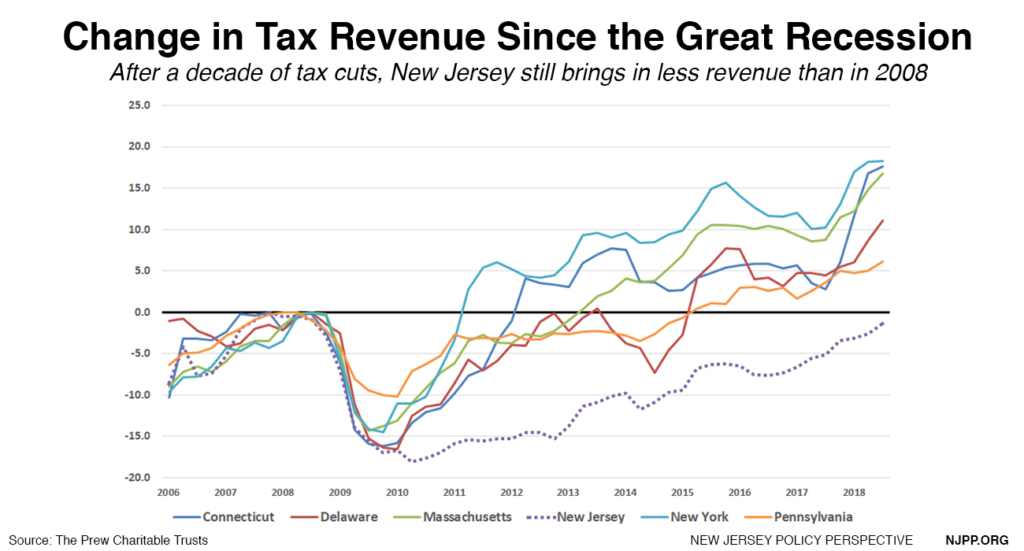The following testimony, on A4, was delivered to the Assembly Appropriations Committee on December 18, 2020.
Good morning, Chairman Burzichelli and members of the Assembly Appropriations Committee. My name is Sheila Reynertson and I am a senior policy analyst at New Jersey Policy Perspective. Thank you for the opportunity to testify on A4.
First, we applaud the important improvements in this legislation regarding oversight and accountability: a robust Community Benefit Agreement requirement, scaled down tax credit cap on each newly created job, tighter reporting requirements, and newly appointed compliance officer and an Inspector General to protect public dollars.
But the scale of this proposal is simply too large. Up until 2010, New Jersey averaged less than $100 million per year on programs authorized by the Economic Development Authority. Only during the Christie administration did the size of the programs balloon to over $1 billion year after year. This proposal takes what should be viewed as unnecessarily exorbitant and attempts to give it a sense of credibility it doesn’t deserve.
Comparable states like Maryland and Massachusetts spend an average of $100.4 million and $193.5 million a year, respectively, on economic development subsidies annually. The idea that New Jersey must have a program of this scale — over $1.5 billion per year — is irresponsible and threatens the state’s short- and long-term fiscal health.
Let’s step back a moment. The original proposal from 2019 topped off at $3 billion. As of last week, negotiations for this bill more than doubled to $7 billion total. And now, here we are looking down the barrel of a $11.5 billion proposal.
What happened? The two biggest programs — the same ones that were out of control under the Christie administration — have ballooned from a combined $300 million limit per year to $1.1 billion a year. At the same time, the minimum job and affordable housing requirements have both been watered down. How does that serve New Jersey taxpayers?
And the spending caps on these fabled “mega-projects” that may or may not transpire have ballooned as well. Originally, up to three redevelopment deals in the transformative program could each receive up to $100 million in tax credits. Now, 10 such large projects could be approved, and each could receive up to $250 million in tax credits each. The annual cap for the other mega-project concept — the institution-anchored redevelopment program — doubled from $100 million to $200 million.
Meanwhile, as we witness the biggest crisis to hit small businesses in our lifetime, this legislation throws them a bone with a loan program that may or may not allocate $50 million per year.
Two years. This legislature had two years of expert testimony from the state Comptroller and national experts at organizations like Pew Charitable Trusts and the Conference of State Legislatures who described the downsides of massive subsidies and limited upside. Best practices and sound research were tossed aside to “get this done before the year ends.” And nobody had the courage to say, “We’ve gone too far.”
Just yesterday, Forbes published an article on the utility of corporate tax subsidies. The jury decision is final, according to economists of all political stripes.
“Conservative scholars at George Mason University’s Mercatus Center find ‘subsidies have little to no effect on where companies choose to invest.’ And progressive economists Alan Peters and Peter Fisher conclude that subsidies work at best 10 percent of the time, ‘and are simply a waste of money the other 90 percent.’”
Ultimately, this bill represents a doubling down on the failed strategy of the 2013 Economic Opportunity Act and will weaken our ability as a state to afford our existing obligations and emerging needs — especially as we recover from the COVID pandemic and recession. The proposal is not sufficiently targeted to the areas of New Jersey’s economy that will need the greatest support and will weaken our ability to bolster proven economic drivers and pay down our oversized obligations.
A vote in favor of this legislation says you have confidence that the state will have enough resources in 10 years to simultaneously pay down the recently borrowed $4.5 billion and dole out tax subsidies by the billions. It’s the height of irresponsible stewardship of the public’s money.
We are not implying that the state completely forgoes tax subsidies — we are stating unequivocally that a program of this size is irresponsible and needs to be scaled back, specifically in the job growth and redevelopment programs.
We respectfully request legislators to vote NO on A4 and allow for time to rightsize this tool of economic development so it can fit back into the toolbox.
I am happy to answer any questions you may have. Thank you.


